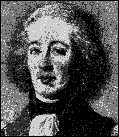Count General Gustaf Wachtmeister (1757-1826)
 This controversial figure began his military career after having gone through military school as an ensign at the Kronoberg regiment 1772, whereafter he was made lieutenant in the king's Värvade regiment. Thereafter Wachtmeister did some service in the Prussian army, where he participated in the War of the Bavarian Succession. After his return to Sweden, Wachtmeister steadily rose in military rank. In 1787 he married the countess Henrietta Elisabet Falkenberg.
This controversial figure began his military career after having gone through military school as an ensign at the Kronoberg regiment 1772, whereafter he was made lieutenant in the king's Värvade regiment. Thereafter Wachtmeister did some service in the Prussian army, where he participated in the War of the Bavarian Succession. After his return to Sweden, Wachtmeister steadily rose in military rank. In 1787 he married the countess Henrietta Elisabet Falkenberg.
In 1788 Gustaf Wachtmeister was Generaladjutant (Aide General) and served in the 1788-90 Russian war. At Walkiala in 1790, he was wounded in his right arm, while leading the rear guard, and was immediately raised to the rank of Major General. He even received praise from king Gustav III himself. The returning war hero then received his own regiment in Sweden, and during the first years of the reign of Gustav IV Adolf Wachtmeister participated in the government. He also held a command during the Pomeranian War against the French.
It was not until 1809 that Gustaf Wachtmeister was to go into history. Having been promoted to the full rank of general in July, he was given the command of the forces that were to be landed in the back of Kamenskij's Russian troops that were operating in Northern Sweden. The plan was well thought out. In cooperation with the Coastal Navy and the Northern Army under Fabian Wrede, Wachtmeister was landed at Ratan with a considerable force, actually the last operational regiments of the Swedish kingdom. Wachtmeister marched south after the landing, but stopped at Sävar. And there he was attacked by the Russians.
Sävar was a bitter defeat in August of 1809. Wachtmeister threw in his battalions, one after one, without giving them the advantage of developing a concentrated attack. Kamenskij used all his reserves though and a decisive attack by the Swedes could have broken the Russian army. This was not to happen though. Wachtmeister retreated back north, to Ratan, where his army was under the protection of the firepower of the Coastal Navy. The Swedish troops were evacuated on the ships some time after this. His careful leadership, on the brink of cowardly, has earned Wachtmeister a very bad reputation in history. His nickname after the defeat at Sävar was "duc d'Säfvar". After the war, Gustaf Wachtmeister retired from the army (1813) to his estates, where he died in 1826.
Wachtmeister's conduct at Sävar is still something of a historical mystery. Before Sävar, he had proven his bravery and experience in the war of 1788-90. The blame for the defeat at Sävar is probably the result of the errors of many people, but he became the scapegoat. In Swedish historywriting, he is still very much the "duc d'Säfvar".
Back to Biographies
© Göran Frilund 2000-03, All Rights Reserved.
If you've surfed onto this page from outside and there is no menu on the left,
CLICK HERE for the full Website.
 This controversial figure began his military career after having gone through military school as an ensign at the Kronoberg regiment 1772, whereafter he was made lieutenant in the king's Värvade regiment. Thereafter Wachtmeister did some service in the Prussian army, where he participated in the War of the Bavarian Succession. After his return to Sweden, Wachtmeister steadily rose in military rank. In 1787 he married the countess Henrietta Elisabet Falkenberg.
This controversial figure began his military career after having gone through military school as an ensign at the Kronoberg regiment 1772, whereafter he was made lieutenant in the king's Värvade regiment. Thereafter Wachtmeister did some service in the Prussian army, where he participated in the War of the Bavarian Succession. After his return to Sweden, Wachtmeister steadily rose in military rank. In 1787 he married the countess Henrietta Elisabet Falkenberg.